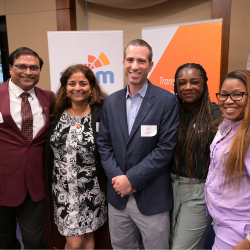AUTM Board Advocacy - Leading By Example
 Explaining what technology transfer is - its benefits to society - and its need for strong IP protections and workable regulation are essential to successful advocacy efforts. It is essential that AUTM continues to serve as a leader when educating stakeholders about the importance of balanced regulations to influence policy decisions that promote innovation and economic growth.
Explaining what technology transfer is - its benefits to society - and its need for strong IP protections and workable regulation are essential to successful advocacy efforts. It is essential that AUTM continues to serve as a leader when educating stakeholders about the importance of balanced regulations to influence policy decisions that promote innovation and economic growth.
Last month, the AUTM Board of Directors met in Washington, D.C. for the third year in a row. While it conducted regular business for part of its meeting, the reason to be in the Nation’s Capital was to combine that work with direct advocacy by board members on Capitol Hill.
In the weeks leading up to the meeting, board members were given a list of potential lawmakers from their state that they should try and meet with. With the help of their federal relations officers, most held meetings on both the House and Senate sides of the Capitol to explain tech transfer to congressional staffers and to seek support for AUTM’s view of several key issues.
While each meeting had a slightly different flavor, board members focused on three key issues:
- They explained AUTM’s concerns about the proposed framework at the National Institute of Standards and Technology (NIST) to redefine the rules for when agencies could consider “marching-in” on patents in the name of price controls. As of this writing, no final decisions have been made despite several rumors that a decision was imminent. They implored lawmakers to oppose the proposal and explained AUTM’s view that it goes beyond the law, would not impact drug prices in any meaningful way and would seriously impair overall efforts to commercialize all types of innovation.
- They urged support for the Promoting and Respecting Economically Vital American Innovation Leadership (PREVAIL) Act. This Senate legislation (with a House companion bill) seeks to rein in the ill effects of the Patent Trial and Appeals Board (PTAB), which has caused chaos for many patents. The board members explained how strong patent rights were essential to moving forward on discoveries and told of the need for less gaming of the system.
- Finally, they informed lawmakers about potential dangers of the Invent Here, Make Here legislation in the Senate. This proposal from Senators Tammy Baldwin (D-WI) and JD Vance (R-OH) would – in its original form – rewrite the Bayh-Dole Act in a way that would make working with overseas countries much more complicated.
 As board members dove into these issues to educate Capitol Hill, they were able to help shape future conversations about AUTM’s role in IP legislation and expand the organization’s reach as being a key resources for future IP education needs.
As board members dove into these issues to educate Capitol Hill, they were able to help shape future conversations about AUTM’s role in IP legislation and expand the organization’s reach as being a key resources for future IP education needs.
Recently, a survey was sent to tech transfer directors to see if they would be willing to do similar Hill meetings in conjunction with next March’s AUTM Annual Meeting in D.C. Your university’s willingness to have you and your federal relations officers engage on these issues is the key to fighting for our future.